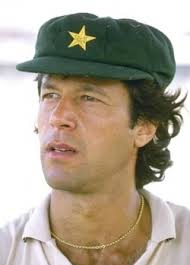Imran Khan on the field – Captain, Leader, Legend
No introductions should ever be needed for
a man so loved, so adored and respected not just in his motherland, but all
around the world. Imran Khan isn’t just among the greatest Pakistani cricketers
of all times, but his name would surely make it to the list of the most
influential leaders in the history of this planet. Imran Khan’s name would
stand second to no one’s. He was, is and always will be a captain, leader and a
legend. While, Khan’s popularity over the years has been in the form of a
public figure in the world of politics, we would today pay tribute to his
legendary on field cricketing career which introduced the world to one of the
greatest leaders ever.
Imran Khan ended his cricketing
career as Pakistan’s most successful captain, leading his country to its first
ever Cricket World Cup in 1992. Khan played for the greens for over two
decades, from 1971 to 1992, captaining the side from 1982 onwards. Khan retired
from cricket right at the end of the 1987-88 World Cup, but was called by then
Pakistan President Zia Ul Haq, to captain the side in the 1992 Wolrd CUp. It
was almost as if God had a fairy tail ending for the great Imran Khan. At the
age of 39, coming back from retirement, he led Pakistant to their first ever
World Cup. Khan was one of the world’s greatest all-rounders, some would argue
he was the “greatest”. In 2010, Imran Khan was inducted into the ICC Cricket
Hall of Fame.
A
perfect career
First
Class/Domestic:
Khan always had a thing for cricket ever since his
childhood. His proper cricketing days came in Lahore, when he was aged 16, in
high school. Khan was picking up the game rapidly, and by the early 70s, he was
playing for Lahore’s local teams, (Lahore A and B etc). Khan persued his
University life in the University of oxford, where he also played for the
institution’s cricket team from 1973 to 75. Fair to say, his early career was a
mere portion of what he later on went to become. Khan played for the
Worcestershire county from 1971 to 76, where he was only known to be an average
medium paced bowler. Khan also represented Pakistan domestic sides Dawood
Industries and PIA in the late 70s. Khan played half a decade for Sussex from
1983 to 1988.
International:
Khan made his Test Debut for Pakistan against
England at just 19 years of age. Only 3 years later, he featured in his first
One Day International for the greens, that too against England at Nottingham
for the Prudential Trophy. After completing his Oxford University academic
career, Khan travelled back to Pakistan in 1976 and began regularly being
feature in the national side. Pakistan face both New Zealand and Australia
during that season, and Khan turned out giving a decent helping hand against
two sides that were considered very strong in those days. He toured the West
Indies, where he signed for Kerry Packer’s famous World Series cricket.
IN 1978, Khan took part in a fast bowling
competition at Perth. He finished third at a speed of 139.7 km/h, beating the
likes of Dennis Lille, Garth Le Roux and Andy Roberts. Only the greats Jeff
Thomson and Micheal Holding finished above Khan.
Khan’s climb to the
top of the ladder was a slow and gradual process, but a legendary one
nonethelss. He reached the prime of his bowling powers in 1982. In that year,
Khan played 9 Test matches, picking up 62 wickets at an average of 13.29. The
average was the lowest by any Test bowler to have picked up 50 wickets in a
single year. Khan would have been ranked the no.1 bowler in the world during
the 83 season, but unfortunately we had no “ICC player ratings” back in the
days. The period was considered one of Khan’s best and was enough to still rank
him third in the all Time Test rankings.
Khan became the second fastest man to reach the
all-rounders triple ( scoring past 300 runs and picking 300 plus wickets), only
behind his fierce rival Ian Botham. Botham did it in 72 Tests, while Khan just
missed by a whisker, with 75.
The latter part of Khan’s international career gave birth to a new world Class
batsman in the Pakistan batting lineup. Pakistan already had the services of
some of the all time greats like Javen Miandad and Zaheer Abbas, but the
addition of Khan’s resurgent batting talent to the fold was taken as nothing
but a surpluss. He ended up being ranked second in the highest all time batting
average (61.86) by a test batsman coming in at no. 6.
Imran Khan played
his closing Test for Pakistan against Sri Lanka in January 1992. Six months
later, he featured heroicly in the 1992 World Cup for his side, a tournament in
which Pakistan seemed down and out in the group stages. But nothing ever seems
over for a leader like Imran Khan. People would argue that rain saved a
Pakistan side that was on the brink of getting knocked out, but the smart ones
would judge it was Khan’s leadership, belief and bravery that led Pakistan to
their first ever World Cup Glory.
Khan retired after what would arguably be declared
the greatest World Cup victory in history. He finished his legendary career
with 88 Test Matches, scoring 3807 runs at an average of 37.69. That average
could have been 50 plus, had the first half of his Test career been more
fruitful with the bat. Nonetheless, it was still an epic career for an
all-rounder, as he managed 6 centuries and 18 fifties. He bagged a staggering
362 wickets with the ball in tests, breaking the all time Pakistan record back
then, and also becoming the 4th bowler in cricket history to do so at that
time.
Khan played 175 One Day Internationals for Pakistan,
scoring 3709 runs with the bat at an average of 33.41, which was absolutely
phenomenal. He picked up 182 wickets in the 50 over format, at an average of
26.4.
Imran Khan Domestic Career
The
greatest all-rounder ever?
Even among the names of some of the world’s all time
greatest all-rounders, Imran khan’s name stands out. He was the absolute
complete package, wasn’t he? With the bat, he had super technique, with which
he could attack and defend at will. As a bowler, he had everything, pace, line,
length, and most important of all, some deadly swing. Moreover, he was a super
influential captain who held the Pakistan team together by the immense force of
his charismatic personality. Apart from West Indian legend, which the
cricketing books regard as the greatest all-rounder ever, Imran Khan’s stats
stand out pretty well with every other great all-rounder.
One of the biggest
factors that would make Khan stand out among the great all-rounders was that
multiple times in his career; the great Pakistani was ranked among the world’s
best in both bowling and batting. Though, bowling was considered his main
weapon throughout his career, but following a career threatening leg injury,
Khan began concentrating more on his batting, and it paid dividends. Khan
became a world force in the batting department, a force such big, that in his
closing 5 years, his batting average was among those of the very best batsman
in the world at that time.
World’s Best All-Rounders (1980-1988)
Khan’s peak period was the 80s decade where he was easily the
best all-rounder in World Cricket. Fair comparisons would be made with kiwi
Richard hadlee, but Khan was clearly ahead the stats sure don’t lie. Between
1980 and 1988, Khan had a bowling average of 17.77, which was a whooping 22
less than his batting average. This difference clearly made him stand out among
the world’s best all-rounder with 1500 runs and 100 wickets during that period.
Taking nothing away from the legendary Hadlee, who put on show some exceptional
bowling performances during that period, he just couldn’t quite stand toe to
toe with Imran Khan in the batting department. Khan’s rivals Ian Botham and
Kapil Dev were less superior with the ball.
Best
All-Rounders (All Time) (At least 3000 runs and 200 wickets)
Now extending our analysis to the all time stats for the all-rounder who scored at least 3000 runs with the bat, and picked up 200 wickets at an average of at least 2 wickets per Test. Only Gary Sobers had an all time higher difference of batting and bowling averages than Pakistan’s Imran Khan. Many modern day cricket fans would argue about Jacques Kallis making it to the list. Although, Kallis too is among the greatest all-rounders of all times, his bowling had always been more of a bit-part role-play. Although he had a massive difference between his batting and bowling averages, Kallis picked up 266 wickets in 140 Tests, which meant an average of less than 2 wickets per game.





No comments:
Post a Comment